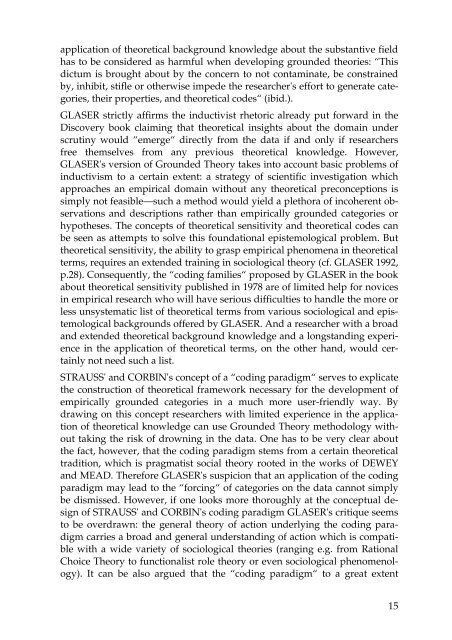Volltext - SSOAR
Volltext - SSOAR
Volltext - SSOAR
- TAGS
- volltext
- ssoar
- www.ssoar.info
Erfolgreiche ePaper selbst erstellen
Machen Sie aus Ihren PDF Publikationen ein blätterbares Flipbook mit unserer einzigartigen Google optimierten e-Paper Software.
application of theoretical background knowledge about the substantive field<br />
has to be considered as harmful when developing grounded theories: “This<br />
dictum is brought about by the concern to not contaminate, be constrained<br />
by, inhibit, stifle or otherwise impede the researcher's effort to generate categories,<br />
their properties, and theoretical codes“ (ibid.).<br />
GLASER strictly affirms the inductivist rhetoric already put forward in the<br />
Discovery book claiming that theoretical insights about the domain under<br />
scrutiny would “emerge“ directly from the data if and only if researchers<br />
free themselves from any previous theoretical knowledge. However,<br />
GLASER's version of Grounded Theory takes into account basic problems of<br />
inductivism to a certain extent: a strategy of scientific investigation which<br />
approaches an empirical domain without any theoretical preconceptions is<br />
simply not feasible—such a method would yield a plethora of incoherent observations<br />
and descriptions rather than empirically grounded categories or<br />
hypotheses. The concepts of theoretical sensitivity and theoretical codes can<br />
be seen as attempts to solve this foundational epistemological problem. But<br />
theoretical sensitivity, the ability to grasp empirical phenomena in theoretical<br />
terms, requires an extended training in sociological theory (cf. GLASER 1992,<br />
p.28). Consequently, the “coding families“ proposed by GLASER in the book<br />
about theoretical sensitivity published in 1978 are of limited help for novices<br />
in empirical research who will have serious difficulties to handle the more or<br />
less unsystematic list of theoretical terms from various sociological and epistemological<br />
backgrounds offered by GLASER. And a researcher with a broad<br />
and extended theoretical background knowledge and a longstanding experience<br />
in the application of theoretical terms, on the other hand, would certainly<br />
not need such a list.<br />
STRAUSS' and CORBIN's concept of a “coding paradigm“ serves to explicate<br />
the construction of theoretical framework necessary for the development of<br />
empirically grounded categories in a much more user-friendly way. By<br />
drawing on this concept researchers with limited experience in the application<br />
of theoretical knowledge can use Grounded Theory methodology without<br />
taking the risk of drowning in the data. One has to be very clear about<br />
the fact, however, that the coding paradigm stems from a certain theoretical<br />
tradition, which is pragmatist social theory rooted in the works of DEWEY<br />
and MEAD. Therefore GLASER's suspicion that an application of the coding<br />
paradigm may lead to the “forcing“ of categories on the data cannot simply<br />
be dismissed. However, if one looks more thoroughly at the conceptual design<br />
of STRAUSS' and CORBIN's coding paradigm GLASER's critique seems<br />
to be overdrawn: the general theory of action underlying the coding paradigm<br />
carries a broad and general understanding of action which is compatible<br />
with a wide variety of sociological theories (ranging e.g. from Rational<br />
Choice Theory to functionalist role theory or even sociological phenomenology).<br />
It can be also argued that the “coding paradigm“ to a great extent<br />
15

















